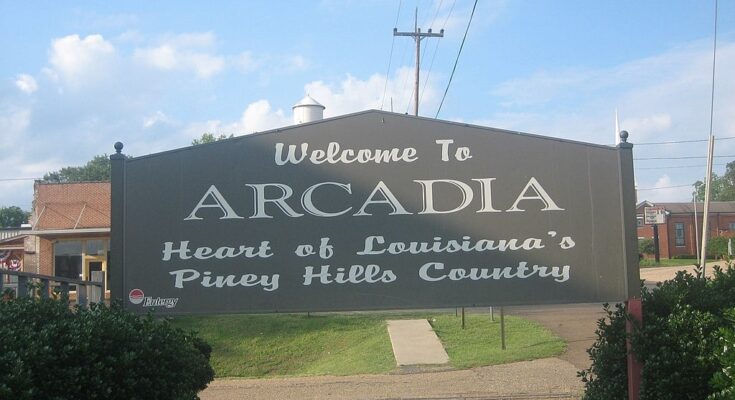
The prevalence of Greek-named towns and cities in Louisiana is a testament to the enduring influence of Greek culture and mythology on Western civilization.
This influence continued into the colonial era of the United States when many early settlers were familiar with classical Greek literature and history.
Greek names often carry symbolic or mythological significance. For example, the name “Athens” evokes images of democracy and intellectual pursuits, while “Sparta” represents military strength and discipline. These symbolic associations can make Greek names attractive for towns and cities.
Also, Greek names can be unique and memorable, making them stand out from other town names.
Louisiana’s Greek-Named Towns
Athens
This name is quite common in the United States, and Louisiana is no exception. There’s an Athens in Louisiana, named after the Greek capital.
As of the census of 2000, there were 262 people, 112 households, and 73 families residing in the village. The population density was 119.2 inhabitants per square mile.

Sparta
Sparta is now a deserted village that now sleeps silently within the borders of modern-day Bienville Parish. It pays homage to the ancient Spartan city-state renowned for its military prowess and discipline.
The parish seat was moved to Arcadia in 1893, and the village of Sparta was deserted in 1894. Today, almost nothing of old Sparta remains.
Homer
Homer, Louisiana is indeed another example of a place name with Greek origins. It’s named after the ancient Greek epic poet, Homer, the author of the Iliad and the Odyssey.
The choice of Homer as a name for a Louisiana town likely reflects the town’s interest in classical literature, history, or a desire to evoke a sense of ancient wisdom and storytelling.

Eureka
The word “eureka” comes from the ancient Greek phrase “Ευρήκα!” (pronounced “Heurēka!”), which translates to “I have found it!” This phrase is famously attributed to the Greek mathematician and inventor Archimedes.
While Eureka, Louisiana, might not have a specific connection to Archimedes or his discoveries, the name certainly carries a sense of excitement and discovery, echoing the original Greek exclamation.
Castor
Castor, Louisiana is also a town with Greek origins. It’s named after the mythological twin brothers Castor and Pollux, who were known for their close bond and their association with horses.
The choice of Castor as a name for a Louisiana town likely reflects the town’s connection to horses or a desire to evoke a sense of brotherhood, loyalty, and strength.

Alexandria
Alexandria is the ninth-largest city in the state of Louisiana. It is often called, Alec and sits almost in the state’s geographic center. Around 45,000 people live within the city limits.
It was founded in 1805 and designed as a French Fort to guard rapids and waterfalls on the Red River. When he laid out the city, Alexander Fulton named the settlement after his daughter Alexandria who in turn was named after the ancient Egyptian city of Alexandria, which was founded by Alexander the Great.
The choice of Alexandria as a name for a Louisiana town likely reflects the town’s interest in ancient history, its connection to Egypt or a desire to evoke a sense of grandeur and cultural significance.

Arcadia
The name “Arcadia” is directly derived from the ancient Greek region of Arcadia, known for its idyllic landscapes, pastoral life, and mythological associations. In Greek mythology, Arcadia was often associated with the god Pan, the protector of shepherds and forests.
Arcadia has the highest elevation of any incorporated municipality in Louisiana. In 1934, bank robbers Bonnie and Clyde were killed near Arcadia in a shootout. Approximately 2,600 people live in the town originally founded in the 1820s.
The choice of Arcadia as a name for a Louisiana town likely reflects the town’s connection to rural life, its natural beauty, or a desire to evoke a sense of tranquility and idyllic living.

Urania
It’s named after Urania, one of the nine Muses in Greek mythology. Urania was specifically associated with astronomy and celestial bodies.
In the late 1890s, the man considered to be Louisiana’s first conservationist established the town of Urania, Louisiana in what is now La Salle Parish. Henry E. Hardtner was a lumber magnate who took the name Urania from Greek mythology. Approximately 700 people live within Urania’s borders today.
The choice of Urania as a name for a Louisiana town likely reflects the town’s interest in astronomy, science, or a desire to evoke a sense of cosmic mystery and wonder.
Eros
“Eros” is well-known in Greek mythology as the god of love. Only two towns in the United States are named Eros, and one of them is in Jackson Parish, Louisiana. The other is in Arkansas.
As a report in Kxan notes, Eros, Louisiana, dates back to a lumber mill built in 1898 and a woman named Pearl Collins who loved astronomy. She was reading about the 433rd asteroid documented, and she already wanted her community to have its own post office. So what did she do? Collins applied for her community to be named Eros after the asteroid.
But the asteroid was named after the Greek god of love, so you decide if Eros, Louisiana, was named after Eros, the asteroid, or Eros from Greek mythology. Either way, Collins received approval for the post office’s name on October 23, 1899 and Eros has been called Eros ever since.
The prevalence of Greek-named towns and cities in Louisiana reflects the enduring influence of Greek culture and mythology on Western civilization and the desire of people to connect with these ancient traditions.
“Greek culture was important to many of the early settlers in northern Louisiana. From my study in some of the early educational institutions in places like Ruston, Homer, and Mount Lebanon, Greek, and Latin were as much a part of the curriculum as arithmetic in those days,” historian Wesley Harris told Kxan.
Related: Exploring Greek Landmarks in the USA



